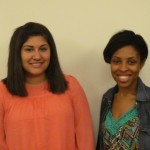Since my first blog I have had the pleasure to work with various college staff, and begin looking through Ms. Rich’s [distinguished alumna Evelyn Rich ’54] papers. Her papers contain information about the various organizations and companies she has worked for.
Her life’s work has been to advocate those whom often go unheard. The advocating she has done for the elderly and public education display her desire to dedicate her life to helping others. Using herself as an instrument of change seemed possible due to the tools she picked up along the way at Bryn Mawr. She has used her Bryn Mawr education as a foundation for her other degrees and as way to gain access to the power structures she wished to transform, by working for the New York City Public School System and Hunter College, among other institutions.
It was great as a current student to see how much her Bryn Mawr education has impacted her life in a positive way, and how as student you can have your own agenda that you can work toward to propel you into success. I feel that listening to her oral history before going through her materials gave me insight into why she was a part of certain organizations. It was great seeing the papers she had about Bryn Mawr when she would come to visit for reunions, and other programs. The papers from Bryn Mawr displayed how involved she has been with the College since her graduation, and how she is interested in using the tools she at learned at Bryn Mawr to help transform this college, as well.
Her life seems to be one of service which is very admirable. All of her papers reveal how she is advocating for those who might often go unheard or ignored in the public sector. It was great to see that her desire to help others still continues, even with her contributing to this internship.
Throughout the summer, Lauren Footman ’15 and Alexis De La Rosa ’14, the inaugural Pensby Center interns, will blog about their research projects. The Pensby Center (formerly The Office of Intercultural Affairs) implements programs and activities that address issues of diversity, power and privilege, including but not limited to race, ethnicity, country of origin, class, gender, sexual orientation, religious affiliation and disability, with a goal of improving the campus climate and enhancing community life at Bryn Mawr College.

